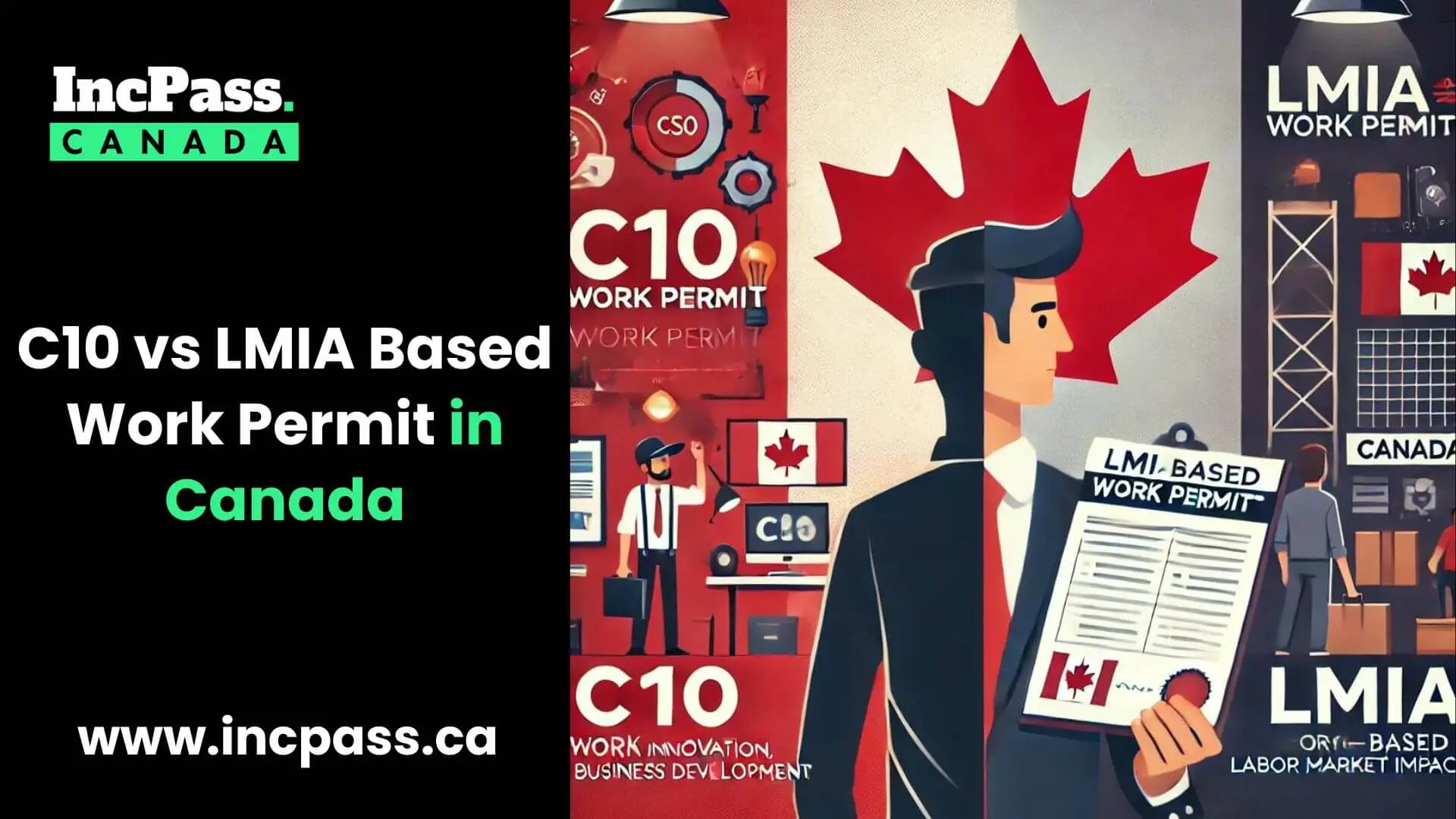Introduction
When it comes to work permits in Canada, two prominent alternatives are C10 work permit and LMIA-based work permits. The C10 work permit, which falls under the considerable benefit category, is intended for those whose labour brings significant benefits to Canada. In contrast, the LMIA-based work permit requires companies to get a Labour Market Impact Assessment, which demonstrates the requirement for a foreign worker owing to a shortage of acceptable Canadian candidates.
While the LMIA procedure can take several months and cost companies approximately CAD $1,000 per application, the C10 permit provides a faster, more flexible alternative for qualified workers, highlighting important distinctions in eligibility, processing periods, and employer engagement.
Eligibility Criteria for C10 vs LMIA based work permit
Eligibility Criteria for C10 Work Permit
- The applicant must demonstrate that their work will give significant cultural, social, or economic benefits to Canada.
- No job offer or Labour Market Impact Assessment (LMIA) are necessary.
- Typically used by entrepreneurs, self-employed individuals, and intra-company transferees
Eligibility Criteria for LMIA-Based Work Permit
- Employers must get a positive LMIA that demonstrates there are no eligible Canadians available for the role.
- A Canadian employer must make a job offer.
- The LMIA application needs the employer to pay a processing charge of CAD 1,000.
- The applicant must meet particular job requirements, such as necessary skills, experience, and language ability.
Application Process for C10 vs LMIA Based Work Permit
Application Process for C10 Work Permit:
- Please include proof of considerable benefit to Canada, such as cultural, social, or economic contributions.
- Provide regular work permit application forms and prices.
- Processing times vary, but are often faster than LMIA-based permits.
Application Process for LMIA-Based Work Permit:
- Employer sends an LMIA application to Employment and Social Development Canada (ESDC), along with a CAD $1,000 fee and proof of recruiting.
- Wait for a positive LMIA result, which could take months.
- When the LMIA is accepted, the candidate submits a work permit application together with the employment offer.
- The overall processing period could be several months.
Processing Times for C10 vs LMIA Based Work Permit
Processing Times for C10 Work Permit:
- Permits issued through the LMIA are typically speedier.
- The length of processing times varies from a few weeks to multiple months.
- There is no requirement for an LMIA, which cuts down on overall application time.
Processing Times for LMIA-Based Work Permit
- The initial LMIA processing time by ESDC might range from 8 to 12 weeks.
- The employer will need more time to gather and submit the appropriate documentation.
- Work permit applications might take many weeks to months to process after the LMIA has been authorised.
- Overall, the entire process can take many months to complete.
Employer Involvement for C10 vs LMIA Based Work Permit
Employer Involvement for C10 Work Permit
- Employers are only required to participate minimally.
- There is no requirement for a job offer or an LMIA.
- Concentrates on the applicant’s capacity to demonstrate a significant benefit to Canada.
Employer Involvement for LMIA-Based Work Permit
- A high level of employer involvement is necessary.
- Employment and Social Development Canada (ESDC) must approve the employer’s LMIA application.
- The applicant must show efforts to employ Canadian citizens or permanent residents and pay a CAD 1,000 LMIA processing fee.
- The employer must make a formal employment offer and give ongoing support during the application process.
Advantages and Disadvantages of for C10 vs LMIA Based Work Permit
C10 Work Permit:
Advantages:
- An LMIA is not required for this flexible application process.
- Processing times are faster.
- Suitable for those who provide substantial benefits to Canada.
Disadvantages:
- Stringent criteria for demonstrating considerable cultural, social, or economic advantages.
- Only certain applications are eligible.
LMIA-Based Work Permit:
Advantages:
- Applicability across a wide range of work areas.
- Employers can tackle specific labour shortages.
- Applicants may be able to get permanent residency.
Disadvantages:
- The LMIA process is lengthy and expensive (CAD 1,000 charge).
- The employer must demonstrate considerable recruitment efforts.
- Processing times are longer overall than for C10 permits.
Conclusion
Finally, both C10 and LMIA-based work permits provide unique opportunities for foreign workers to contribute to Canada’s economy and society. The C10 work visa is a simple and adaptable alternative for anyone who can demonstrate significant cultural, social, or economic benefits to Canada, making it perfect for entrepreneurs and self-employed people. Despite its lengthy and costly process, the LMIA-based work permit is vital for firms looking to fill specific labour shortfalls. Understanding the differences in eligibility, application processes, and benefits allows candidates and employers to select the best option for their needs.
FAQs
What does the C10 work permit entail?
Individuals who provide significant cultural, social, or economic benefits to Canada are eligible for this permission; no LMIA is necessary.
What exactly is an LMIA-based work permit?
An authorization requiring corporations to obtain a positive LMIA demonstrating that there are no qualified Canadian candidates for the position.
How much time does it take to issue each permit?
C10: Few weeks to months. LMIA-based: Several months, including LMIA and work permit procedures.
What are the cost implications for each permit?
C10: Reduced prices; no LMIA fee. CAD 1,000 LMIA charge, higher employer.




